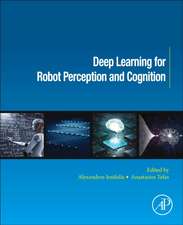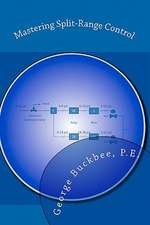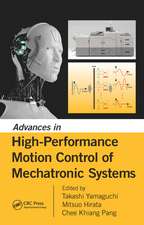Towards Analytical Techniques for Systems Engineering Applications: Studies in Systems, Decision and Control, cartea 286
Autor Griselda Acosta, Eric Smith, Vladik Kreinovichen Limba Engleză Paperback – 7 mai 2021
| Toate formatele și edițiile | Preț | Express |
|---|---|---|
| Paperback (1) | 772.47 lei 6-8 săpt. | |
| Springer International Publishing – 7 mai 2021 | 772.47 lei 6-8 săpt. | |
| Hardback (1) | 778.32 lei 6-8 săpt. | |
| Springer International Publishing – 7 mai 2020 | 778.32 lei 6-8 săpt. |
Din seria Studies in Systems, Decision and Control
- 18%
 Preț: 937.89 lei
Preț: 937.89 lei - 18%
 Preț: 729.53 lei
Preț: 729.53 lei - 20%
 Preț: 627.40 lei
Preț: 627.40 lei - 15%
 Preț: 644.18 lei
Preț: 644.18 lei - 18%
 Preț: 900.80 lei
Preț: 900.80 lei - 18%
 Preț: 947.35 lei
Preț: 947.35 lei - 20%
 Preț: 1467.93 lei
Preț: 1467.93 lei - 18%
 Preț: 1012.84 lei
Preț: 1012.84 lei - 15%
 Preț: 653.33 lei
Preț: 653.33 lei - 20%
 Preț: 835.23 lei
Preț: 835.23 lei - 18%
 Preț: 1112.30 lei
Preț: 1112.30 lei - 20%
 Preț: 934.24 lei
Preț: 934.24 lei - 24%
 Preț: 726.59 lei
Preț: 726.59 lei - 18%
 Preț: 1004.81 lei
Preț: 1004.81 lei - 20%
 Preț: 924.72 lei
Preț: 924.72 lei - 18%
 Preț: 1010.48 lei
Preț: 1010.48 lei - 20%
 Preț: 932.21 lei
Preț: 932.21 lei - 18%
 Preț: 1007.35 lei
Preț: 1007.35 lei - 18%
 Preț: 752.43 lei
Preț: 752.43 lei - 18%
 Preț: 1000.24 lei
Preț: 1000.24 lei - 18%
 Preț: 999.45 lei
Preț: 999.45 lei - 18%
 Preț: 1016.81 lei
Preț: 1016.81 lei - 18%
 Preț: 949.73 lei
Preț: 949.73 lei - 18%
 Preț: 1119.38 lei
Preț: 1119.38 lei - 18%
 Preț: 1412.20 lei
Preț: 1412.20 lei - 20%
 Preț: 1163.21 lei
Preț: 1163.21 lei - 18%
 Preț: 1116.26 lei
Preț: 1116.26 lei - 18%
 Preț: 783.20 lei
Preț: 783.20 lei - 18%
 Preț: 952.09 lei
Preț: 952.09 lei - 20%
 Preț: 1472.54 lei
Preț: 1472.54 lei - 18%
 Preț: 1392.46 lei
Preț: 1392.46 lei - 20%
 Preț: 1180.52 lei
Preț: 1180.52 lei - 18%
 Preț: 1567.67 lei
Preț: 1567.67 lei - 20%
 Preț: 984.18 lei
Preț: 984.18 lei - 20%
 Preț: 369.86 lei
Preț: 369.86 lei - 20%
 Preț: 1281.17 lei
Preț: 1281.17 lei - 18%
 Preț: 1582.67 lei
Preț: 1582.67 lei - 18%
 Preț: 1112.30 lei
Preț: 1112.30 lei - 20%
 Preț: 1055.94 lei
Preț: 1055.94 lei - 18%
 Preț: 1405.90 lei
Preț: 1405.90 lei - 18%
 Preț: 961.55 lei
Preț: 961.55 lei - 20%
 Preț: 1053.48 lei
Preț: 1053.48 lei - 20%
 Preț: 1049.37 lei
Preț: 1049.37 lei - 18%
 Preț: 1005.74 lei
Preț: 1005.74 lei - 18%
 Preț: 1225.94 lei
Preț: 1225.94 lei - 18%
 Preț: 1232.26 lei
Preț: 1232.26 lei - 18%
 Preț: 957.94 lei
Preț: 957.94 lei - 18%
 Preț: 890.54 lei
Preț: 890.54 lei
Preț: 772.47 lei
Preț vechi: 942.04 lei
-18% Nou
Puncte Express: 1159
Preț estimativ în valută:
147.83€ • 154.14$ • 122.86£
147.83€ • 154.14$ • 122.86£
Carte tipărită la comandă
Livrare economică 20 martie-03 aprilie
Preluare comenzi: 021 569.72.76
Specificații
ISBN-13: 9783030464158
ISBN-10: 3030464156
Ilustrații: X, 101 p. 1 illus.
Dimensiuni: 155 x 235 mm
Greutate: 0.17 kg
Ediția:1st ed. 2020
Editura: Springer International Publishing
Colecția Springer
Seria Studies in Systems, Decision and Control
Locul publicării:Cham, Switzerland
ISBN-10: 3030464156
Ilustrații: X, 101 p. 1 illus.
Dimensiuni: 155 x 235 mm
Greutate: 0.17 kg
Ediția:1st ed. 2020
Editura: Springer International Publishing
Colecția Springer
Seria Studies in Systems, Decision and Control
Locul publicării:Cham, Switzerland
Cuprins
Formulation of the Problem.- Analytical Techniques for Describing User Preferences: 80/20 Rule Partially Explains 7 Plus Minus 2 Law.- Analytical Techniques Help Enhance the Results of Data Mining: Case Study of Cow Insemination.- Case When Analytical Techniques Invalidate the Conclusions of Data Mining: Reversed Flynn Effect of Decreasing IQ Test Scores.- Analytical Techniques for Taking into Account Several Aspects of a Designed Systems: Case Study of Computation-Communication Tradeoff.- Analytical Techniques for Testing: Optimal Distribution of Testing Resources Between Different System Levels.- Index.
Textul de pe ultima copertă
This book is intended for specialists in systems engineering interested in new, general techniques and for students and practitioners interested in using these techniques for solving specific practical problems. For many real-world, complex systems, it is possible to create easy-to-compute explicit analytical models instead of time-consuming computer simulations. Usually, however, analytical models are designed on a case-by-case basis, and there is a scarcity of general techniques for designing such easy-to-compute models. This book fills this gap by providing general recommendations for using analytical techniques in all stages of system design, implementation, testing, and monitoring. It also illustrates these recommendations using applications in various domains, such as more traditional engineering systems, biological systems (e.g., systems for cattle management), and medical and social-related systems (e.g., recommender systems).
Caracteristici
Discusses analytical techniques for systems engineering applications Formulates and analyzes general problems corresponding to different stages of system design, implementation, testing and monitoring Uses examples to demonstrate how the corresponding analytical techniques can be applied in various domains Presents applications ranging from biological and biomedical systems (from cows to humans) and social systems (such as recommender systems), to physical systems (for which a new system-based explanation of the minimum entropy principle is provided), and engineering systems























